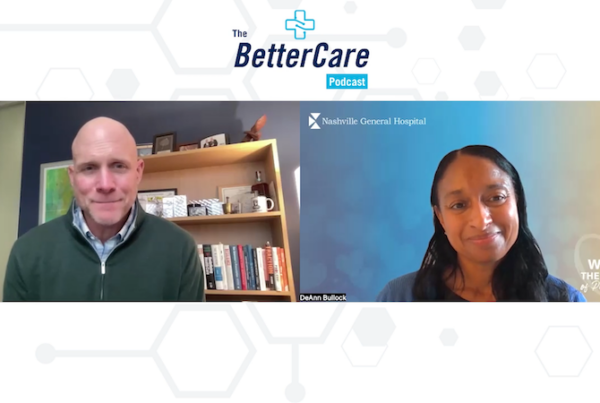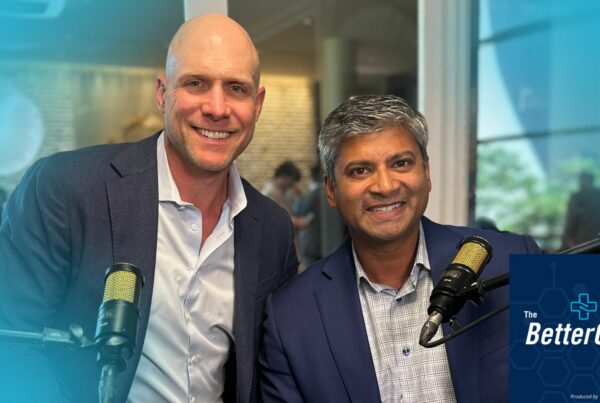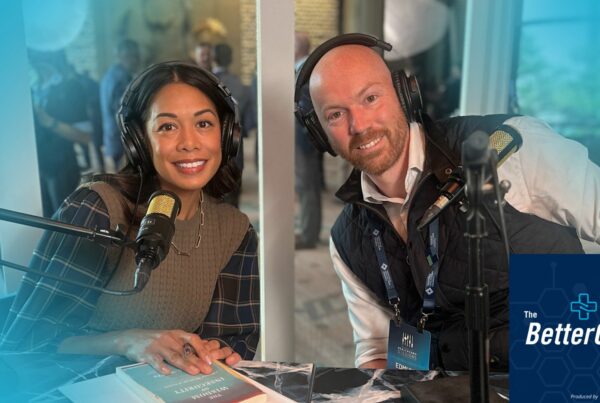In today’s rapidly evolving healthcare landscape, it is essential for hospitals to adapt and prioritize the appropriate metrics for clinical operations and workflows that ensure future growth.
FJ Campbell, MD, Chief Medical Officer (CMO) at Ardent Health Services, recently shared his insights with EvidenceCare CMO, Brian Fengler, in Episode 7 of The Better Care Podcast. This article shares key points discussed during the podcast, exploring Dr. Campbell’s perspective on the importance of clinical operations and highlighting Ardent’s most impactful initiatives.
Some quotes have been slightly edited for brevity.
Key Metrics for Future Growth
To ensure success and foster future growth as a healthcare organization, it is crucial to align key metrics with long-term goals. This might mean the difficult process of recognizing when current metrics need to be reassessed and identify areas that require adjustments. Regularly monitoring and adapting metrics to accommodate the evolving healthcare industry is essential.
When Dr. Campbell first joined Ardent, the health system’s focus was on clinical outcomes and operations relevant to value-based care like hospital-acquired infections, readmissions, and mortality rates. Prioritizing these areas and paying attention to operational details led to significant success from a value-based purchasing and care perspective.
However, Dr. Campbell shared that over time the metrics they were concentrating on did not align with the future direction of healthcare.
“What I realized was that this situation had a time limit, and we were neglecting the crucial metrics that would shape our future, such as patient acquisition and affordable services outside the hospital.
Identifying and addressing the needs of deteriorating patients to prevent hospital readmissions was not receiving the attention it deserved. It became evident that we were overly fixated on hospital care. Around three years ago, we started assessing the necessary shifts in our care approach. As the system’s CMO, this shift has consumed a significant portion of my attention and efforts.” – FJ Campbell
Standardizing Quality and Safety
Ardent’s commitment to providing high-quality care across its network of hospitals is evident in its achievement of an A safety rating from the The Leapfrog Group for ten of its hospitals. Dr. Campbell credits this success to their focus on specific metrics within Leapfrog’s evaluation, including hospital-acquired infections, patient safety indicators, ICU staffing, and electronic medical records (EMRs).
Standardizing efforts to address hospital-acquired infections and implementing interventions for sepsis, congestive heart failure, and readmissions, were driven by Ardent’s mission as a health system. Leveraging the power of Epic across all systems allowed for uniform clinical workflows and contributed to system-wide results.
“This achievement has been a system-wide effort, and that’s why we’ve had system-wide results. Leapfrog happens to be the outcome of very specific endeavors within Ardent. We’re fortunate that as a result, their measures seem to be in alignment with our clinical priorities.” – FJ Campbell
Embracing Clinical Workflow for Better Outcomes
During the COVID-19 pandemic, health systems across the world faced challenges in terms of access to nursing staff and available beds. This led to a push for a more sustainable bedside nursing model and improved working conditions for nurses and technicians. To address this, Ardent focused on automating the collection of vital signs, partnering with BioIntelliSense to implement BioButton® for patients.
Dr. Campbell shared that by automating vital sign collection, Ardent aims to identify patients who are deteriorating earlier, easing the workflow burden on nurses and providing them with crucial information to deliver timely care.
“The goal here is to demonstrate the success of automating the collection of vital signs to be able to do a better job of identifying patients who are deteriorating. That has a huge impact on the intellectual and emotional welfare of nurses.
“There is a wide range of normal vital signs, but in order for them to be meaningful and relevant, you would need to collect them around two hundred times per day. We lack the physical capacity to accomplish such a task. This is where the utilization of technology comes into play, enabling us to make a more significant clinical impact.” – FJ Campbell
For physicians, specifically, Ardent partners with EvidenceCare to implement its EHR-workflow integrated clinical decision support software that improves decision-making at the point of care.
Local Initiatives and System-Wide Success
Success in clinical operations and innovation often begins by allowing experimentation and encouraging end-users to identify problems and propose solutions, by fostering a culture of continuous improvement. Successful initiatives at one hospital can then be expanded and deployed across a health system, leveraging the collective expertise of the healthcare professionals within the system.
The involvement of clinicians in operations, and operators in clinical decision-making, is highly valuable. This multidisciplinary approach, fostering collaboration between clinical operators and operational clinicians, has consistently resulted in positive outcomes and nurtures a more entrepreneurial mindset within the organization.
“COVID-19 brought some positive changes. We became a more effective multidisciplinary organization, making rapid cycle changes. We embraced entrepreneurship, being willing to try, experiment, fail, adapt, and succeed. Retaining our multidisciplinary effort was a priority.
Clinicians learned about operations, operators became more clinical, and the synergy between them improved. We emerged as a better organization from COVID, and it’s crucial to sustain our progress.” – FJ Campbell
Investing in Innovation and Partnerships
Recognizing the need to adapt to the changing healthcare landscape, Ardent has embraced innovation and partnerships to stay ahead. The creation of an Innovation Studio and collaboration with SwitchPoint Ventures reflect Ardent’s commitment to developing new solutions and services. By acting as developers and joint venture with innovative startups, Ardent aims to fill the gap between identifying problems and creating minimally viable products.
“As we began to grasp the shift towards providing care outside of the hospital, we developed a greater connection with startup companies. From my perspective, there are several stages involved in working with a startup company’s product.
First, it’s about defining a problem. Then, it’s about designing an intervention for that problem. Finally, it’s about actually creating a minimally viable product, which is typically when we receive contact.” – FJ Campbell
Dr. Campbell shared the importance of selecting the right partners, focusing on those who understand clinical workflow challenges and have a genuine commitment to patient care. Ardent’s leadership is focused on providing stability and a long-term perspective, ensuring the organization’s ability to control risk and adapt to industry changes.
“Companies that prioritize workflow often emerge from individuals who have personally experienced and grappled with the problem at hand. When I encounter technologies developed by doctors, nurses, or social workers who have engaged with the issue on a personal level, they can articulate the specific problems they encountered and how it affected their lives.” – FJ Campbell
Digital Health Opportunities
Digital health presents significant opportunities for healthcare organizations. Dr. Campbell highlights remote patient monitoring as a crucial area for opportunity. Being able to identify patients who are deteriorating at home can enable proactive interventions and prevent the need for hospital readmissions.
The remote patient monitoring space and telehealth in the home offer avenues for improving care coordination and reaching patients with targeted, relevant outreach based on their specific healthcare needs.
“A key strength for us will be our unwavering dedication to stay closely connected with the patient, holding their hand throughout their entire journey. We strive to be the trusted broker of their trust, ensuring no distance or disconnect arises between the patient and our team.
This pursuit will face fierce competition, and thus, we are heavily investing in this endeavor. Care coordination and care steerage will be integral core competencies for us.” – FJ Campbell
Key Takeaways:
-
- Adapting to change and prioritizing the right metrics that align with your hospital’s goals are crucial for success.
- Standardizing quality and safety measures and leveraging technology for workflow improvements contribute to system-wide achievements.
- Embracing innovation, partnerships, and engaging clinicians in operations enhance care coordination and proactive interventions.
- Digital health opportunities like remote patient monitoring and telehealth provide avenues for improved healthcare outcomes.
Listen to the Full Episode of The Better Care Podcast, to hear FJ Campbell and Brian Fengler share more detailed initiatives and strategies. Available now on all major podcast platforms.









